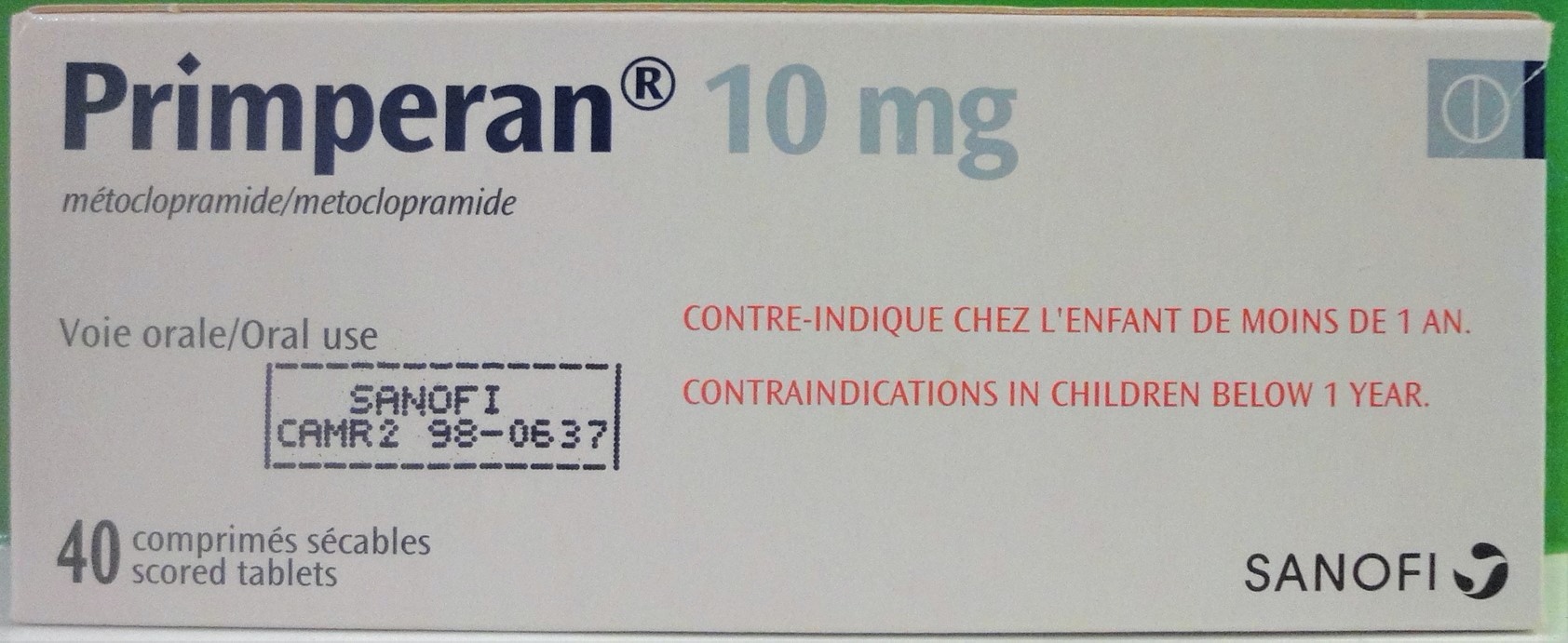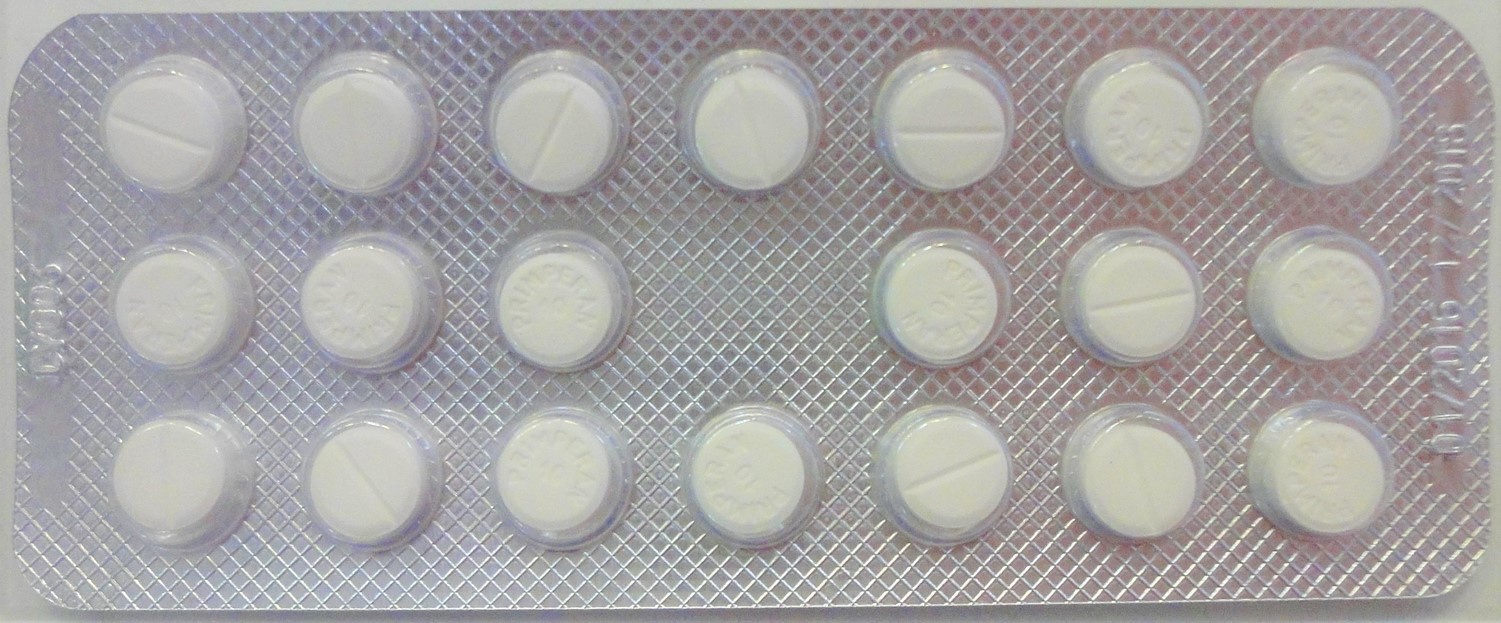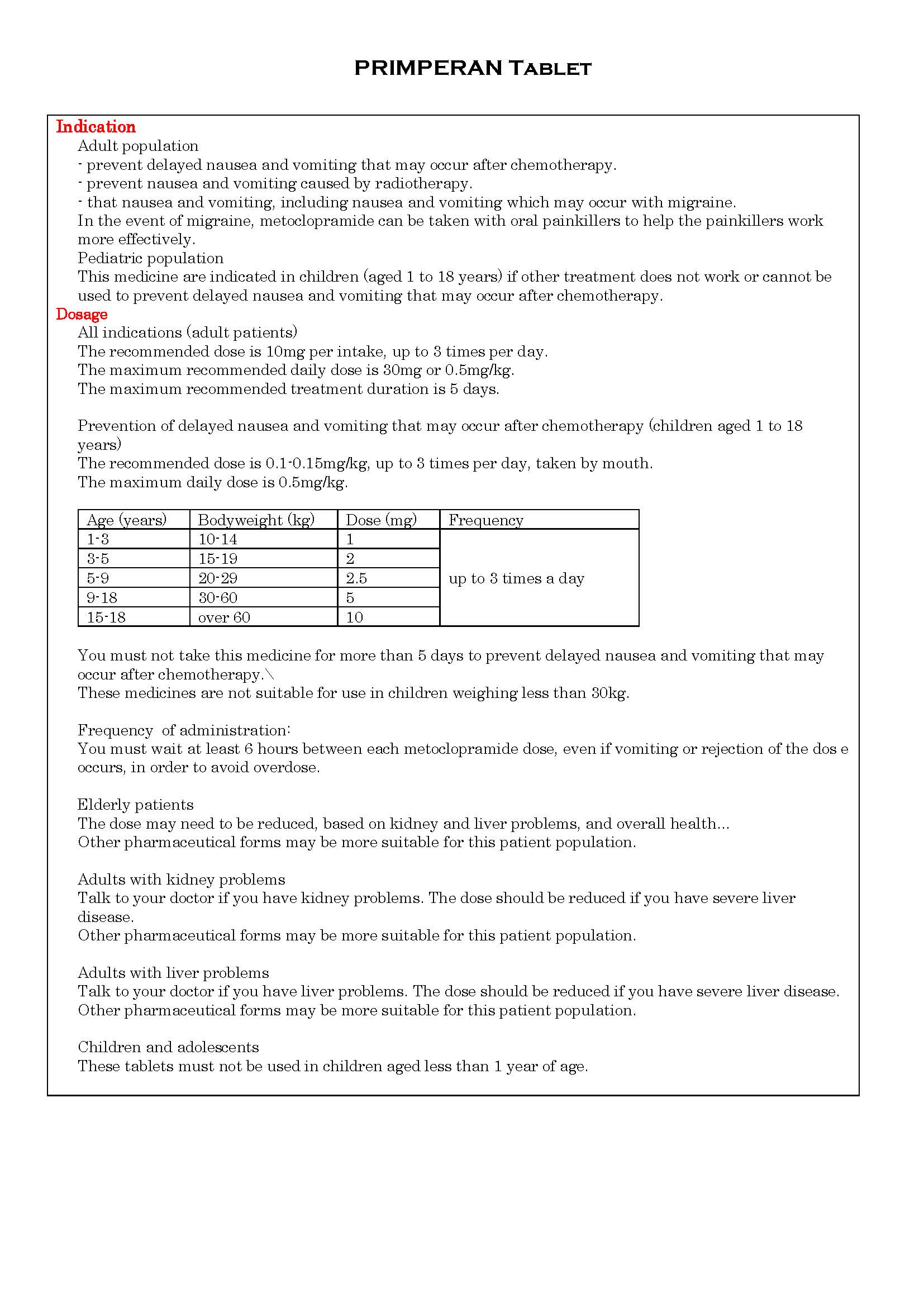PRIMPERAN Tablet
ក្រុមហ៊ុនផលិតឱសថ:
Sanofi Winthrop Industrie, France
ក្រុមហ៊ុនចែកចាយឱសថនៅប្រទេសកម្ពុជា:
SANOFI


- សារធាតុសកម្ម
- ប្រសិទ្ធិភាពព្យាបាល និង កម្រិតប្រើប្រាស់
- ហាមប្រើ
- ផលរំខាន
- អន្តរប្រតិកម្ម
- ស្ត្រីមានផ្ទៃពោះ និង ស្ត្រីបំបៅដោះកូន
- ការប្រុងប្រយ័ត្នជាពិសេស
- សកម្មភាពឱសថ បរិយាយប័ណ្ណឱសថ
-
សារធាតុសកម្ម
Metoclopramide 10mg
-
ប្រសិទ្ធិភាពព្យាបាល និង កម្រិតប្រើប្រាស់

-
ហាមប្រើ
・You are allergic to metoclopramide or any of the other ingredients of this medicine.
・You have bleeding, obstruction or a tear in the stomach or gut.
・You have or may have a rare tumor of the adrenal gland, which sits near the kidney (pheochromocytoma).
・You have ever had involuntary muscle spasms (tardive dyskinesia), when you have been treated with a medicine.
・You have epilepsy.
・You have Parkinson's disease.
・You are taking levodopa (a medicine used for Parkinson's disease) or dopamine agonists.
・You have abnormal levels of a blood pigment (methemoglobinemia) in your blood, or have NADH-cytochrome b5 deficiency.
-
ផលរំខាន
Stop the treatment and talk straight away to your doctor or pharmacist if you experience any of the following symptoms while taking this medicine:
- Abnormal movements (often involving the head or neck). These may occur in children or young adults, particularly when high doses are used. These symptoms generally occur at the start of treatment, and may even occur after administration of a single dose. These movements will stop when treated appropriately.
- High fever, high blood pressure, convulsions, sweating, excessive saliva production. These symptoms may be signs of an illness known as neuroleptic malignant syndrome.
- Itching or skin rash, swelling of the face, lips or throat, difficulty breathing, which may be signs of an allergic reaction which may be severe.
Very common (affecting more than 1 in 10 patients)
・feeling drowsy.
Common (affecting up to 1 in 10 patients)
・depression
・abnormal movements such as tics, shaking, twisting movements or muscle contraction (stiffness, rigidity)
・symptoms similar to Parkinson’s disease (rigidity, tremor)
・nervousness
・blood pressure decrease (particularly with the intravenous route)
・diarrhea
・feeling weak
Uncommon (affecting up to 1 in 100 patients)
・raised blood levels of a hormone called prolactin which may cause milk production in men and women who are not breast-feeding
・irregular menstrual periods
・hallucinations
・consciousness disorders
・slow heart beat (particularly with the intravenous route)
・allergy
Rare (affecting up to 1 in 1000 patients)
・confusional state
・convulsions (particularly in epileptic patients).
Frequency not known (cannot be estimated from the available data)
・abnormal blood pigment levels which may change the color of your skin
・abnormal development of breasts (gynecomastia)
・involuntary muscle spasms after long-term use, particularly in elderly patients.
・high fever, high blood pressure, convulsions, sweating, excessive saliva production.
These symptoms may be signs of an illness known as neuroleptic malignant syndrome.
・changes in heart rate, which may be shown on an ECG
・cardiac arrest (particularly when administered by injection)
・shock (severe decrease of heart pressure) (particularly when administered injection)
・fainting (particularly with the intravenous route)
・allergic reaction which may be severe (particularly with the intravenous route)
・very high blood pressure.
-
អន្តរប្រតិកម្ម
・levodopa or other medicines used for Parkinson's disease,
・anticholinergic agents (medicines used to relieve stomach cramps or spasms),
・morphine derivativves (medicines used to treat severe pain),
・sedative medicines,
・medicines used to treat mental health problems,
・digoxin (medicine used to treat heart failure),
・cyclosporin (medicine used to treat certain problems with the immune system),
・mivacurium and suxamethonium (medicines used to relax muscles)
・fluoxetine and paroxetine (medicines used to treat depression)
Alcohol should not be consumed during treatment with metoclopramide because it can increase the sedative effect of this tablets.
-
ស្ត្រីមានផ្ទៃពោះ និង ស្ត្រីបំបៅដោះកូន
If you are pregnant, think you may be pregnant are planning to have a baby, ask your doctor or pharmacist for advice before taking this medicine. If necessary, this tablets may be taken during pregnancy.
This tablets are not recommended if you are breast-feeding because metoclopramide passes into breast milk and may affect your baby.
-
ការប្រុងប្រយ័ត្នជាពិសេស
Ask your doctor or pharmacist for advice before taking this medicine if:
- you have a history of abnormal heart beat (QT interval prolongation) or any other heart problems,
- you have abnormal levels of mineral salts, such as potassium, sodium, and magnesium in your blood,
- you are taking other medicines known to affect the way your heart beats,
- you have a neurological (brain) disorder,
- you have liver or kidney problems. The dose may be reduced in such cases.
Your doctor may prescribe blood tests for you, to check your blood pigment levels. If abnormal levels are observed (methemoglobinemia), treatment will be immediately and permanently discontinued.
You must wait at least 6 hours between each metoclopramide dose, even if vomiting or rejection of the dose occurs, in order to avoid overdose.
Treatment must not last more than 3 months due to the risk of involuntary muscle spasms.
Children and adolescents
Abnormal movements (extrapyramidal disorders) may occur in children and young adults. This medicine must not be used in children under 1 year of age due to the increased risk of abnormal movements.
You should not take this medicine if you have galactose intolerance, Lapp lactase deficiency or glucose-galactose malabsorption syndrome (rare hereditary diseases).
Taking/using other medicines
Tell your doctor or pharmacist if you are taking, have recently taken or might take any other medicines.
-
សកម្មភាពឱសថ
It acts on part of the brain to prevent nausea and vomiting.
*ព័ត៌មានឱសថត្រូវបានរៀបរៀងដោយ អ៊ីម៉ាតុគឹ មេឌីក (ខេមបូឌា) ដោយផ្អែកលើប្រភពព័ត៌មានខាងក្រោម។ សម្រាប់ព័ត៌មានលម្អិត សូមស្វែងរកនៅក្នុងក្រដាសព័ត៌មាននៃឱសថនីមួយៗ ឬ សាកសួរទៅកាន់ក្រុមហ៊ុនឱសថឬតំណាងចែកចាយនៃឱសថនីមួយៗ។
ប្រភពព័ត៌មាន៖
- ក្រដាសព័ត៌មាននៃឱសថសម្រាប់អ្នកជំនាញវេជ្ជសាស្ត្រដែលប្រើប្រាស់នៅប្រទេសជប៉ុន (Pharmaceutical and Medical Devices Agency, Pmda): https://www.pmda.go.jp
- ព័ត៌មានសង្ខេបនៃឱសថសម្រាប់អ្នកជំងឺដែលប្រើប្រាស់នៅប្រទេសជប៉ុន: http://www.rad-ar.or.jp
